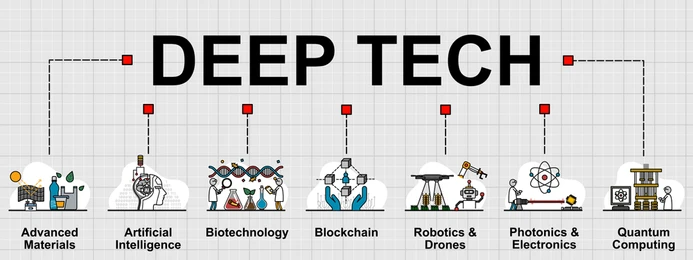Indian Economy
Deep Tech Startups
- 02 Jan 2023
- 6 min read
For Prelims: Deep Tech Startups, Deep Tech, Artificial Intelligence, Machine Learning, Internet of Things, Big Data, quantum computing
For Mains: Deep Tech Startups and India
Why in News?
Government will launch the Digital India Innovation Fund to support deep tech startups.
What is Deep Tech?
- About:
- Deep tech or deep technology refers to a class of startup businesses that develop new offerings based on tangible engineering innovation or scientific discoveries and advances.
- Usually, such startups operate on, but are not limited to, agriculture, life sciences, chemistry, aerospace and green energy.
- Deep tech fields like Artificial Intelligence, advanced materials, blockchain, biotechnology, robotics, drones, photonics, and quantum computing are moving more and more quickly from early research to market applications.
- Characteristics of Deep Tech:
- Impact: The deep tech innovations are very radical and disrupt an existing market or develop a new one. Innovations based on deep tech often change lives, economies, and societies.
- Time & Scale: The time required for deep technology to develop the technology and reach the market-ready maturity is way more than shallow technology development (like mobile apps and websites). It took decades for artificial intelligence to develop and it is still not perfect.
- Capital: Deep tech often requires a lot of early-stage funding for research and development, prototyping, validating hypothesis, and technology development.
What is the State of India’s Deep Tech Startups?
- India had over 3,000 deep-tech start-ups, dabbling in new-age technologies like Artificial Intelligence, Machine Learning (ML), Internet of Things, Big Data, quantum computing, robotics, etc., at the end of 2021.
- According to NASSCOM, deep-tech start-ups in India raised USD 2.7 billion in venture funding in 2021, and now account for over 12% of the country’s overall startup ecosystem.
- In the last decade India’s deep tech ecosystem has grown 53% and is at par with that in developed markets like the US, China, Israel, and Europe.
- Bengaluru accounts for 25-30% of India’s deep-tech start-ups, followed by Delhi-NCR (15-20%) and Mumbai (10-12%).
- Deep-tech start-ups are making their presence felt across sectors like drone delivery and cold chain management to climate action and clean energy.
What are the Challenges Faced by Deep Tech?
- For deep-tech startups, funding is one of the biggest challenges. Less than 20% of startups receive financing.
- Government funds are underutilized, and domestic capital is lacking for such startups.
- Talent and market access, research guidance, investors’ understanding of deep-tech, customer acquisition and cost for talent are the major challenges faced by them.
What are the Related Initiatives?
- The Atal New India Challenge has been launched under the Atal Innovation Mission (AIM) of the Niti Aayog, with an objective to serve as a platform for the promotion of Innovation Hubs, Grand Challenges, startup businesses, and other self-employment activities, particularly in technology-driven areas.
- Launched in 2021, NASSCOM's Deep Tech Club (DTC) 2.0 is aimed at scaling the impact to over 1,000 firms that are leveraging technologies such as AI, ML, Internet of Things, robotics, and blockchain.
Way Forward
- Reevaluate the Roadmaps:
- As the continual growth of the Indian start-up ecosystem is fueled by the ongoing era of constantly emerging new technologies, organizations and the government would need to reevaluate their roadmaps for adopting deep tech.
- As technologies such as 5G, understandable artificial intelligence, quantum computing, cloud-native technologies, cybersecurity meshes, and customer data platforms will be used in the future. There are a number of factors that can help the booming and resilient Indian startup ecosystem become global leaders in deep technology.
- CSR Budget Utilization:
- The social sector has traditionally benefited from Corporate Social Responsibility. However, this growing corpus should also be used to develop strategic technologies.
- A large corporation can be encouraged to contribute to the strategic needs of the nation with some of its budget. There is a need for the government to allow these funds to flow into certain strategic tech startups.
UPSC Civil Services Exam Previous Year Questions (PYQ)
Q. Atal Innovation Mission is set up under the (2019)
(a) Department of Science and Technology
(b) Ministry of Labour and Employment
(c) NITI Aayog
(d) Ministry of Skill Development and Entrepreneurship
Ans: (c)





